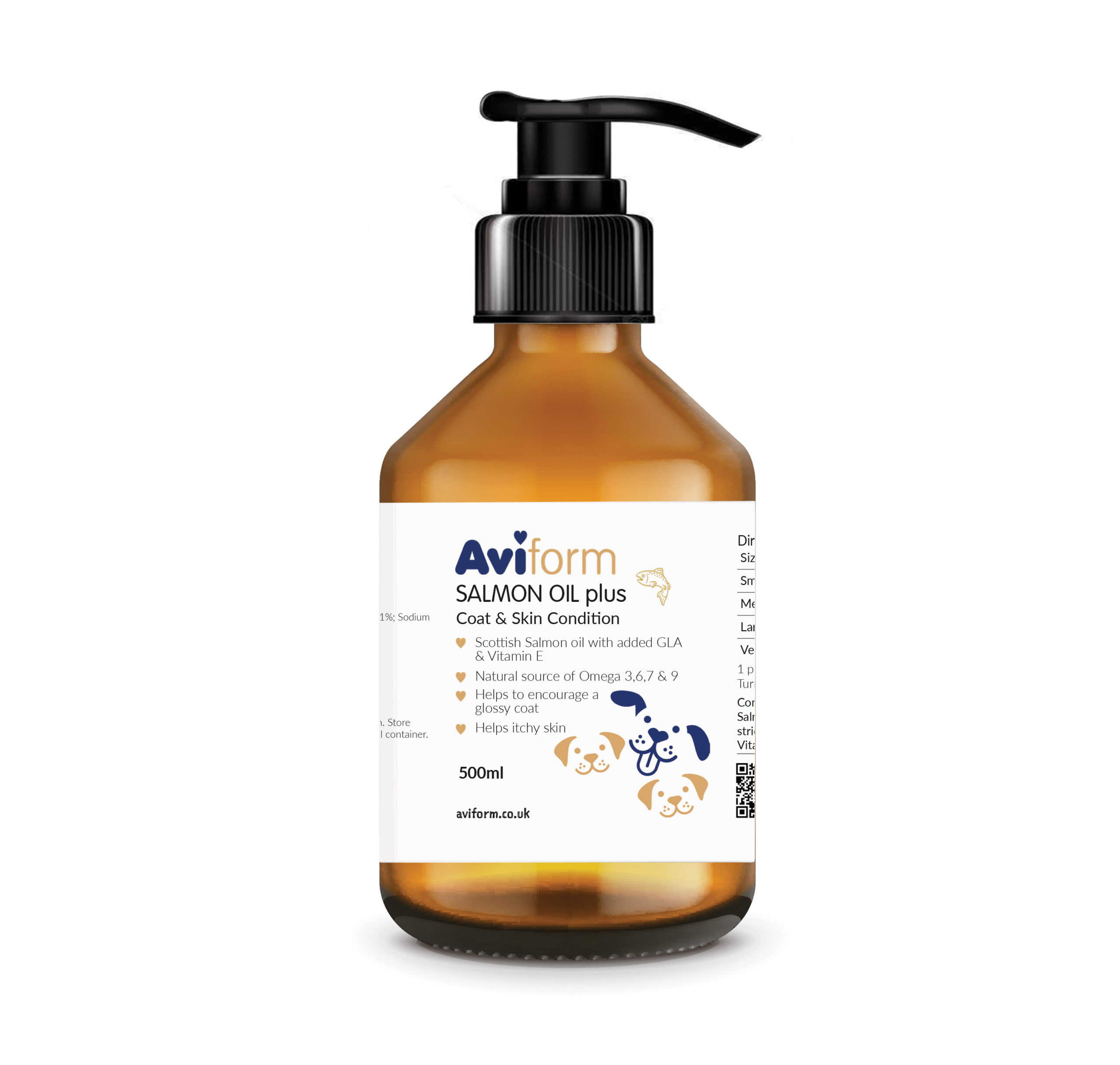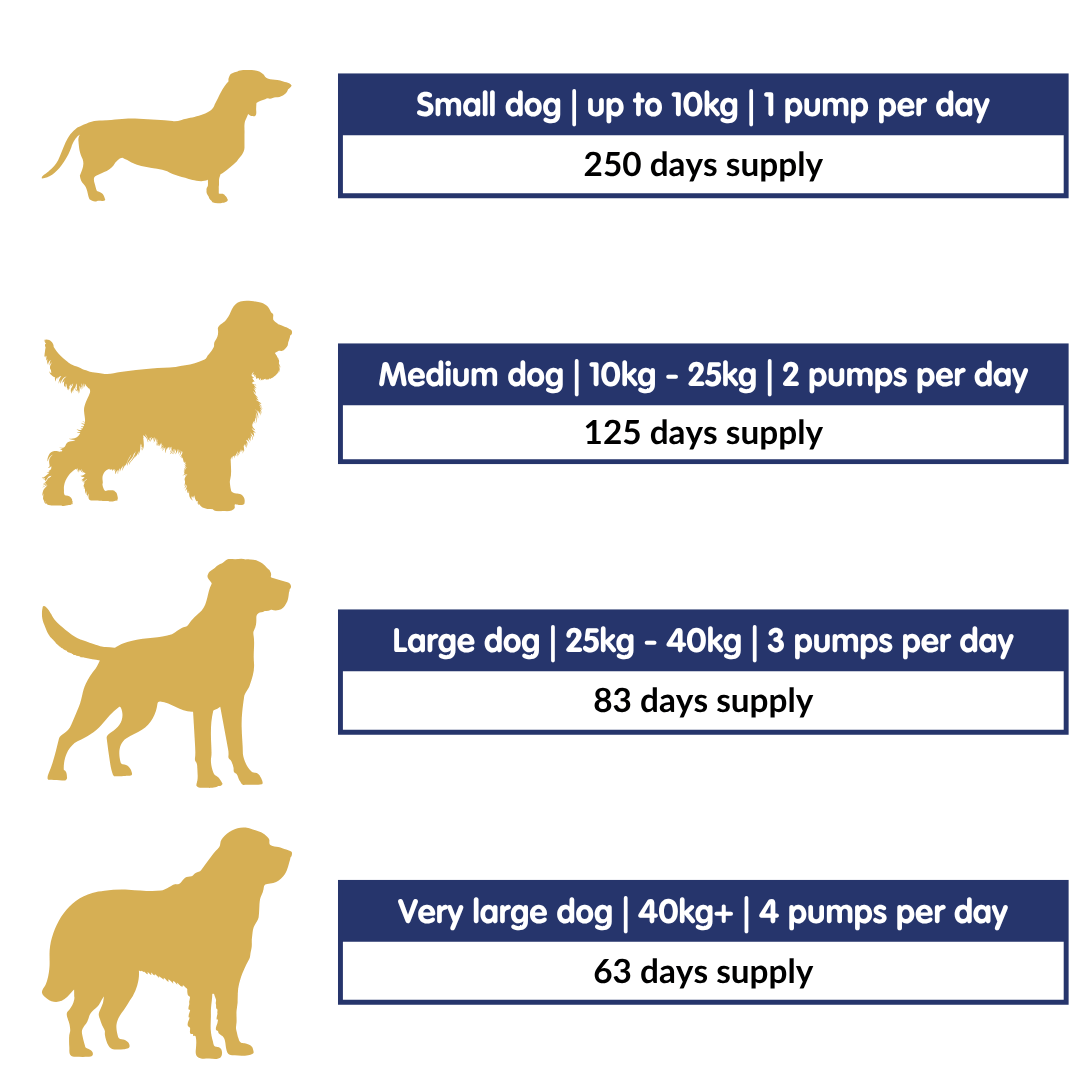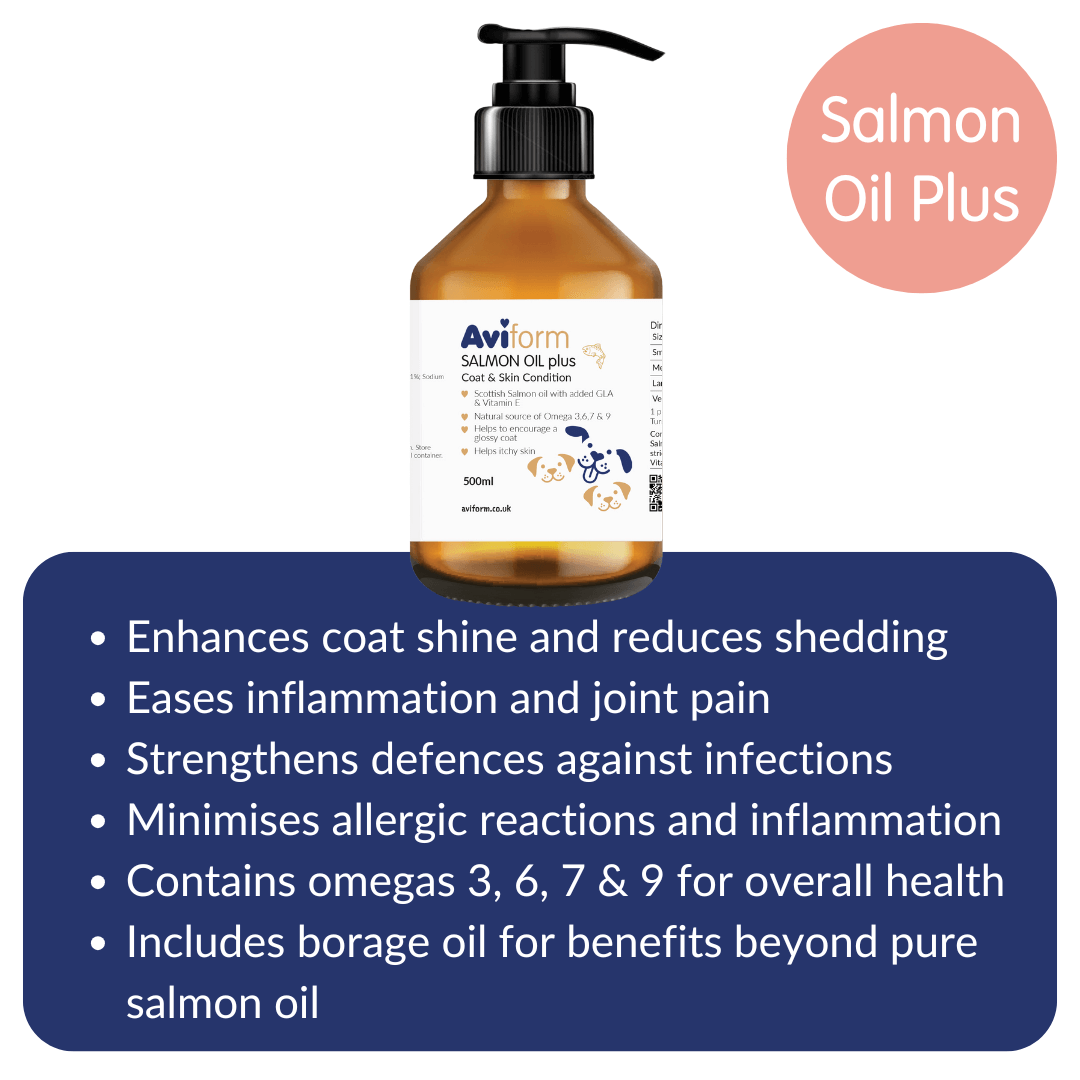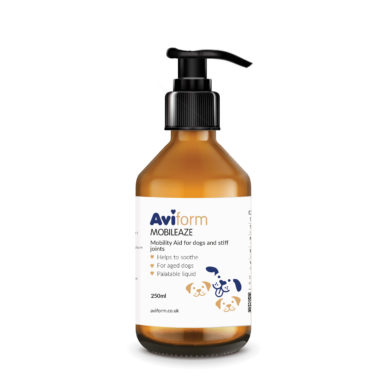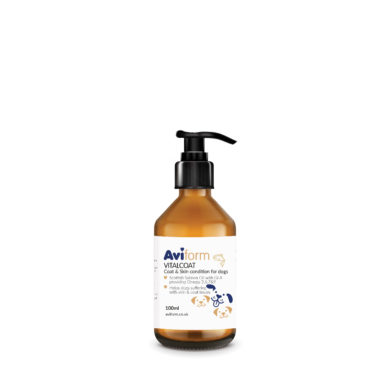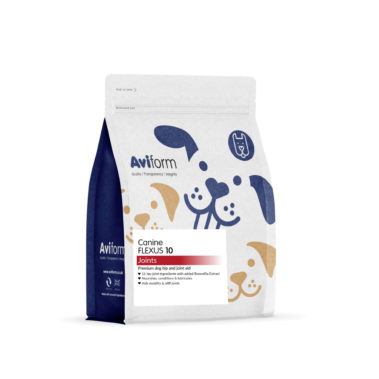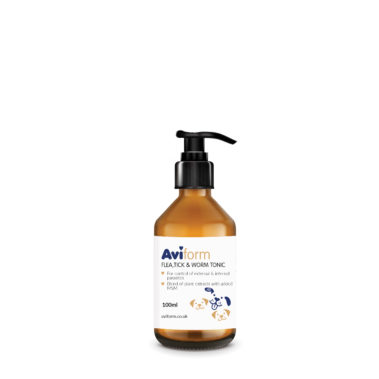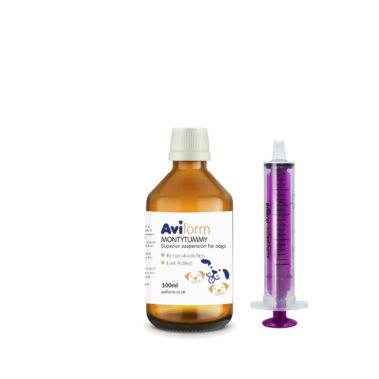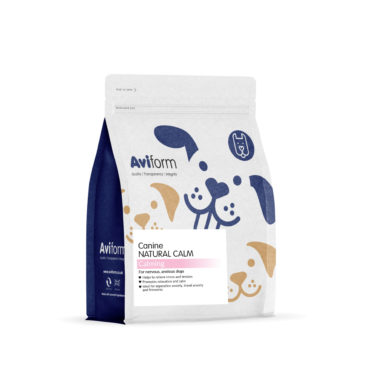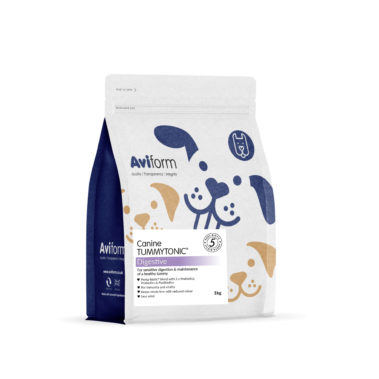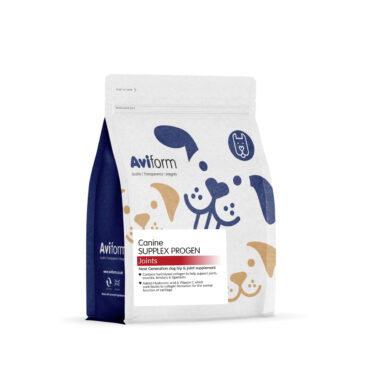Salmon Oil Plus | Coat and Skin Supplement for Dogs
Salmon Oil Plus | Coat and Skin Supplement for Dogs
- Premium Quality Salmon Oil: Contains 99% pure salmon oil sourced from Atlantic salmon raised in sea lochs and open water under strict welfare standards
- Enriched with Added Nutrients: Formulated with Vitamin E and GLA to go beyond traditional salmon oil products.
- Comprehensive Omega Support: Provides Omegas 3, 6, 7, and 9 to promote healthy skin, a shiny coat, and overall wellness.
- 100% Natural Ingredients: Made with pure, natural components for safe and effective care.
- Supports Skin and Coat Health: Keeps your dog’s coat glossy and skin in optimal condition.

-
Salmon Oil Plus Coat & Skin Supplement for Dogs is a unique formulation for dogs, containing proven ingredients for a wide range of skin and coat-related problems.
Salmon Oil Plus contains 99% of salmon oil with vitamin E and added gamma linoleic acid (GLA). This ensures that your dog receives all the (omega) essential fatty acids 3,6,7, and 9 for optimum coat and skin condition and also as a mobility aid in addition to food.
So much more than just salmon oil. Here’s why…
Salmon Oil Plus contains Borage Oil, a rich source of gamma-linolenic acid (GLA). This essential omega-6 fatty acid has been shown to provide a range of health benefits for dogs. Here are some potential benefits of borage oil for dogs:
Promotes healthy skin and coat
Borage oil can help improve the health of your dog’s skin and coat. GLA is known to reduce inflammation and help manage skin conditions such as eczema and dermatitis. Additionally, Borage oil can help reduce shedding and promote a shiny, healthy coat. Bonus!Supports joint health
Borage oil has anti-inflammatory properties that help reduce joint pain and inflammation in dogs with arthritis or other joint problems.Boosts the immune system
GLA has been shown to support the immune system by increasing the production of cytokines, proteins that help fight off infections and disease.Reduces allergic reactions
Borage oil can help reduce allergic reactions in dogs by reducing inflammation and helping to regulate the immune system.Why should I feed Salmon Oil Plus to my dog instead of pure Salmon Oil?
Feeding Salmon Oil plus with added Gamma-linolenic acid (GLA) provides your dog with a higher Omega 6 (including GLA) pure Salmon Oil, which does not contain GLA of any significance.
Looking for an even higher-specification skin and coat conditioner? Check out our Vitalcoat skin and coat conditioner.
My dog loves salmon oil, he loves the taste and it keeps his joints flexible and his coat healthy.
Highest Quality, Guaranteed.
We manufacture and formulate our supplements to an exacting standard of quality and purity. Containing zero bulkers or fillers, they are purely packed with ingredients proven to work.
We know how important it is that our products meet the daily needs of your pup. Therefore, you can combine Aviform dog products to create a tailored combination of ingredients to suit your dog’s needs.
-
<ul>
- 99% Salmon Oil and Vitamin E
- Added Borage Oil providing a
rich source of GLA
- &lt;span style=”font-weight: 400;”>Added Vitamin E as an antioxidant to enhance the product’s shelf life.
- Helps provide a glossy coat</li>
- Healthy coat and skin
- <li style=”font-weight: 400;”>Helps with greasy coat, scaly or itchy skin, and excessive moulting
- “font-weight: 400;”>Helps with mobility
Our products are free of fillers, bulkers, and unnecessary ingredients. We use only the purest ingredients available to ensure your pet is receiving the best nutrition possible. Our products are also backed by our 60 Day See the Difference Guarantee.
-
COMPOSITION Salmon Oil, Borage Seed Oil ADDITIVES PER KG Antioxidant: Alpha-tocopherol 10,000mg ANALYTICAL CONSTITUENTS Crude Fat 0.1%, Crude Protein 0.1%, Crude Fibre 0.1%, Crude Ash 0.2%, Moisture 98%, Lysine 0.1%, Methionine 0.1%, Sodium 0.3% <0.1% FATTY ACID PROFILE Omega 3 - 14.3%, DHA - 5%, EPA -3.6%, DPA - 1.5%, Omega 6 - 16.3%, Omega 7 - 9.6% Omega 9 - 43.5% -
Dog Weight Daily Dose up to 10kg 1 pump 10kg - 25kg 2 pumps 25kg - 40kg 3 pumps over 40kg 4 pumps 1 pump = 2ml Add to feed each day -
Why have we added GLA to this product?
We have added Gamma-Linolenic Acid (GLA) to this product as it is an omega-6 fatty acid that is found in certain plant oils, such as Evening Primrose Oil, Borage Oil, and Black Currant Seed Oil. GLA can help dogs with allergies due to its anti-inflammatory properties.Allergies in dogs often manifest as skin-related issues, including itching, redness, inflammation, and dryness. GLA is believed to help alleviate these symptoms by modulating the inflammatory response in the body.
GLA is also a precursor to certain substances called prostaglandins, which play a role in regulating inflammation. By increasing the availability of GLA, it is thought that the production of anti-inflammatory prostaglandins can be enhanced, while reducing the production of pro-inflammatory ones. This rebalancing of prostaglandins may help to reduce inflammation and alleviate allergic reactions in dogs.
Additionally, GLA will also help improve the condition of the skin and coat in dogs. It can contribute to the maintenance of healthy skin barrier function and promote the production of ceramides, which are important for maintaining skin hydration and preventing excessive water loss. This can be beneficial for dogs with dry, itchy skin caused by allergies.
What source of GLA is contained within Salmon Oil Plus?
&amp;lt;span style=”font-weight: 400;”>We use Borage Oil which is one the richest sources of GLA and typically has twice the GLA content of Evening Primrose Oil.Does Salmon Oil alone contain GLA?
/></b><span style=”font-weight: 400;”>No, Salmon Oil alone does not naturally contain Gamma-Linolenic Acid (GLA).<p>lass=”yoast-text-mark”>yle=”font-weight: 400;”>GLA is an omega-6 fatty acid that is typically found in certain plant-based oils, such as Evening Primrose Oil, Borage Oil, and Black Currant Seed Oil.
Salmon Oil, on the other hand, is primarily known for its high content of omega-3 fatty acids, specifically eicosapentaenoic acid (EPA) and docosahexaenoic acid (DHA). These omega-3 fatty acids are beneficial for various aspects of health, including cardiovascular health, brain function, and reducing inflammation.
Why does Salmon Oil need Tocopherol added?
Salmon Oil, like other fish oils, is rich in omega-3 fatty acids, particularly eicosapentaenoic acid (EPA) and docosahexaenoic acid (DHA). However, fish oils are susceptible to oxidation, which can lead to the formation of harmful free radicals and the degradation of the oil’s quality. Tocopherols, a form of Vitamin E, are often added to salmon oil as a natural antioxidant to prevent oxidation and maintain its freshness and stability. Here are the reasons why tocopherol is added to salmon oil:Antioxidant Protection: Tocopherols, specifically alpha-tocopherol, possess strong antioxidant properties. They help protect the salmon oil from oxidative damage caused by exposure to oxygen, heat, and light. By neutralising free radicals, tocopherols prevent the oil from becoming rancid and extend its shelf life.
Maintaining Nutritional Value: Oxidation of omega-3 fatty acids can result in the loss of their beneficial properties. By adding tocopherols, the oxidation process is slowed down, ensuring that the omega-3 fatty acids in salmon oil retain their nutritional value and health benefits.
Preventing off-flavours and Odours: Oxidised fish oils can develop an unpleasant fishy odour and taste, which may make them unpalatable for dogs or humans. Tocopherols help maintain the freshness of salmon oil, preventing the development of off-flavours and odours, and ensuring a more appealing taste for pets.
What does Omega 3 do for dogs and where does it come from?
Omega-3 fatty acids play a vital role in supporting overall health and well-being in dogs. They are a type of polyunsaturated fat found in salmon oil that offers several benefits. Here’s an overview of what omega-3 fatty acids do for dogs and their common dietary sources:- Healthy Skin and Coat: Omega-3 fatty acids, particularly eicosapentaenoic acid (EPA) and docosahexaenoic acid (DHA), help maintain healthy skin and a glossy coat in dogs. They have anti-inflammatory properties that can reduce skin irritations, itching, and dryness. Omega-3s promote skin hydration, improve coat texture, and minimise excessive shedding.
- Joint Health: Omega-3 fatty acids have been shown to have positive effects on joint health in dogs, particularly in those with arthritis or other inflammatory joint conditions. EPA and DHA help reduce joint inflammation, alleviate pain, and improve joint mobility and flexibility.
- Cognitive Function: Omega-3 fatty acids are beneficial for cognitive health in dogs, supporting brain function and development. They contribute to optimal brain structure, enhance memory, and promote mental acuity in dogs of all ages.
- Cardiovascular Health: Omega-3s help maintain cardiovascular health in dogs by supporting normal heart function, reducing inflammation, and improving blood flow. They have been associated with a lower risk of cardiovascular diseases and can help regulate blood pressure and cholesterol levels in dogs.
- Immune System Support: Omega-3 fatty acids have immune-modulating effects in dogs, helping to regulate the immune system’s response to infections and diseases. They can enhance the dog’s overall immune function and promote a healthy immune response.
What does Omega 6 do for dogs and where does it come from?
Omega-6 fatty acids are essential polyunsaturated fats found in the Borage seed oil that play important roles in maintaining canine health. They offer various benefits to dogs when consumed in appropriate amounts. Here’s an overview of what omega-6 fatty acids do for dogs and their common dietary sources:- Healthy Skin and Coat: Omega-6 fatty acids, particularly linoleic acid, are vital for maintaining healthy skin and a lustrous coat in dogs. They help support the skin’s barrier function, promote hydration, and reduce issues like dryness, itching, and flaking. Omega-6s contribute to a shiny coat, minimise hair loss, and improve overall skin condition.
- Inflammatory Response: Omega-6 fatty acids are involved in the body’s inflammatory response. They play a role in modulating inflammation and immune function. Adequate levels of omega-6s are necessary for a balanced inflammatory response to injury or infection.
- Cell Structure and Function: Omega-6 fatty acids are essential components of cell membranes in dogs. They contribute to maintaining the integrity and fluidity of cell membranes, supporting proper cellular communication, and facilitating various cellular processes.
- Reproductive Health: Omega-6s are important for maintaining reproductive health in dogs. They play a role in hormone production and support the overall reproductive function, including fertility and the development of healthy offspring.
What does Omega 7 do for dogs and where does it come from?
Omega-7 fatty acids, specifically palmitoleic acid, are a type of monounsaturated fat that can offer various potential benefits to dogs. Although not as extensively studied as other omega fatty acids, omega-7s have gained attention for their potential role in supporting certain aspects of canine health. Here is an overview of the potential benefits and sources of omega-7 fatty acids for dogs found in the Salmon oil:- Skin and Coat Health: Omega-7 fatty acids are believed to have a positive impact on skin and coat health in dogs. They can help improve the overall condition of the skin, reduce dryness, and promote a healthy, shiny coat. Omega-7s contribute to maintaining skin barrier function and can help alleviate issues such as itching, inflammation, and dry skin.
- Mucous Membrane Support: Omega-7s may play a role in supporting the health of mucous membranes in dogs. Mucous membranes line various areas of the body, including the digestive tract, respiratory system, and urogenital tract. By promoting the integrity of these membranes, omega-7s can contribute to their optimal function.
- Moisture Retention: Omega-7 fatty acids help promote moisture retention in the skin and other tissues. This can be particularly beneficial for dogs with dry or sensitive skin, helping to improve hydration and reduce discomfort.
What does Omega 9 do for dogs and where does it come from?
Omega-9 fatty acids play a crucial role in maintaining overall canine health and are commonly included in dog food formulations. Omega-9 fatty acids for dogs primarily come from dietary sources such as salmon oil and can support several aspects of their well-being. Here are some key benefits and sources of omega-9 fatty acids for dogs:- Skin and Coat Health: Omega-9 fatty acids help nourish and maintain healthy skin and a shiny coat in dogs. They support the skin’s barrier function, reducing dryness, itchiness, and inflammation. Omega-9s can also help improve the quality of the coat, promoting lustre and reducing shedding.
- Anti-Inflammatory Properties: Omega-9 fatty acids possess anti-inflammatory properties, which can be beneficial for dogs with conditions like allergies, arthritis, or inflammatory bowel disease. They help reduce inflammation and alleviate associated symptoms, such as joint pain and digestive issues.
- Heart Health: Omega-9s contribute to cardiovascular health in dogs. They help maintain healthy blood lipid profiles by increasing levels of beneficial high-density lipoprotein (HDL) cholesterol and reducing levels of harmful low-density lipoprotein (LDL) cholesterol. This balance is crucial for heart health and can help reduce the risk of heart disease in dogs.
- Energy Source: Omega-9 fatty acids serve as a source of energy for dogs. They are metabolised to produce ATP, providing fuel for cellular processes and supporting overall energy levels.
- Weight Management: Omega-9s can aid in weight management for dogs. Including these fatty acids in the diet helps promote a feeling of fullness, reducing excessive food consumption and supporting healthy weight maintenance.
-
 At present, we offer the convenience of subscribe and save solely on our equine and canine supplement ranges. This enables your beloved horses and dogs to benefit continuously from our premium health products.
At present, we offer the convenience of subscribe and save solely on our equine and canine supplement ranges. This enables your beloved horses and dogs to benefit continuously from our premium health products.Regarding th
e duration of your subscription, we believe in flexibility over commitment. Your subscription is entirely in your control, with no fixed contract or minimum period to worry about. You have the liberty to cancel or pause your subscription according to your needs.
Adjustments to your order frequency? Absolutely possible! We understand that life’s demands change, so you’re encouraged to modify the frequency of your orders whenever it suits you.
Need to update your delivery address? No problem at all. You can easily change your delivery location at any time through your account, ensuring your supplements reach you, no matter where you are.
If you feel we’ve missed something or if there’s any other way we can assist you, don’t hesitate to get in touch. Our team is eager to support you and answer any queries you may have.
-

